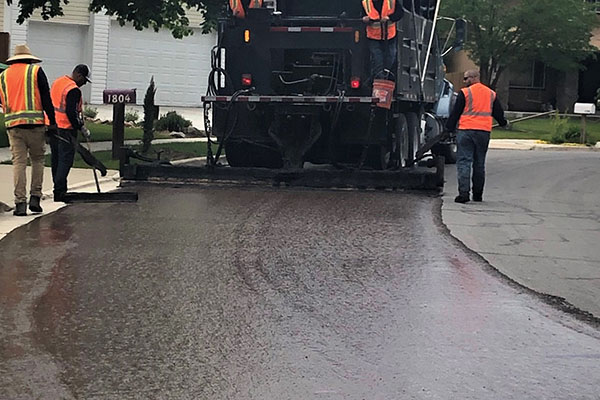Exploring the Different Types of Asphalt Paving and Their Advantages
From the robust qualities of Warm Mix Asphalt to the environment-friendly characteristics of Recycled Asphalt Sidewalk, understanding these choices can dramatically influence project outcomes. Advancements such as Cozy Mix Asphalt and Porous Asphalt present added layers of efficiency and sustainability.
Hot Mix Asphalt
When thinking about the most efficient leading options, warm mix asphalt (HMA) attracts attention as a premier choice for numerous applications (paving). HMA is a flexible leading material understood for its toughness, adaptability, and total efficiency. It is generated by home heating asphalt binder and incorporating it with accumulations at heats, making sure a consistent combination that can withstand various environmental conditions
Among the key benefits of HMA is its capability to offer a smooth, skid-resistant surface, enhancing safety for vehicles and pedestrians alike. Additionally, HMA shows superb resistance to contortion, making it suitable for high-traffic locations such as highways and parking area. Its versatility to various environments even more contributes to its prevalent usage.
The setup process of HMA is reasonably quick, permitting effective project conclusion with marginal interruption to traffic. It can be reused, minimizing waste and promoting sustainability within the building and construction industry. paving service. Generally, hot mix asphalt continues to be a top selection for paving professionals because of its robust efficiency qualities and lasting cost-effectiveness, making it a trustworthy service for different infrastructure demands
Warm Mix Asphalt
Cozy mix asphalt (WMA) offers a cutting-edge alternative to warm mix asphalt, providing similar advantages while requiring reduced production temperatures. Usually produced at temperatures in between 190 ° F and 250 ° F, WMA technology minimizes power consumption and greenhouse gas discharges throughout manufacturing, making it a much more eco friendly choice.
Among the essential benefits of WMA is its extended workability period. The reduced temperature levels enable a lot more reliable transportation and placement, particularly in cooler climate conditions. This versatility can cause boosted compaction and overall toughness of the asphalt surface area. Additionally, WMA can be used in different applications, varying from freeways to household driveways, without compromising performance.

The unification of ingredients or changed binders in WMA adds to its boosted homes, making sure that it satisfies or goes beyond efficiency criteria. WMA's minimized thermal effect during manufacturing can lower the probability of damage to the surrounding setting, making it an enticing option for sustainable paving techniques.
Cold Mix Asphalt
Cold mix asphalt is a versatile leading solution frequently used for short-lived repair work and low-traffic locations. This type of asphalt is generated at ambient temperatures, making it a practical selection for quick solutions and projects where standard warm mix asphalt may not be viable. The mix commonly contains asphalt binder, accumulation, and ingredients, allowing it to stay practical for an extended period.
Among the key benefits check my reference of chilly mix asphalt is its convenience of application. It can be installed without specific tools, making it accessible for smaller specialists and do it yourself enthusiasts. Furthermore, cool mix can be used in various weather conditions, which is especially useful for urgent repair work needs.

Cold mix asphalt is additionally cost-effective, as it permits affordable repair services without giving up top quality. Its adaptability makes it ideal for covering holes, filling cracks, and resurfacing driveways. It may not offer the very same lasting longevity as warm mix asphalt, its fast application and adaptability make it an exceptional selection for short-term services and low-traffic applications. Overall, cold mix asphalt continues to be a sensible choice in the asphalt paving landscape.
(continue reading)
Porous Asphalt
Porous asphalt is an innovative paving remedy made to improve stormwater management and reduce surface area overflow. This type of asphalt includes a special structure that incorporates interconnected gaps, enabling water to penetrate with the surface and into the underlying layers. By assisting in natural water drainage, porous asphalt helps minimize the danger of flooding and diminishes the problem on community stormwater systems.
Among the main advantages of porous asphalt is its ability to enhance water quality. As stormwater filters via the pavement, toxins and sediments are caught, decreasing the variety of contaminants that get in local rivers. This contributes to much healthier ecosystems and sustains compliance with environmental laws.
Furthermore, permeable asphalt can enhance the durability of the sidewalk itself. By decreasing water buildup externally, it lessens the potential for freeze-thaw cycles that can result in fracturing and wear and tear. In addition, the reduced requirement for typical stormwater management facilities can cause cost savings for districts and developers.
Recycled Asphalt Pavement
(learn everything)Recycled asphalt sidewalk (RAP) stands for a sustainable method to highway construction and maintenance that benefits both the setting and the economy. By reusing existing asphalt products, RAP lowers the demand for new raw materials, which in turn preserves natural resources and reduces ecological influence. This technique lowers energy consumption and greenhouse gas discharges connected with the manufacturing of brand-new asphalt.
The unification of RAP right into new pavement mixes can likewise cause considerable expense savings. Specialists can utilize recycled products to lower total task expenditures, making it a financially sensible alternative for municipalities and private developers alike. Additionally, RAP offers equivalent efficiency features to virgin asphalt, ensuring resilience and longevity in road surface areas.
RAP's adaptability enables it to be utilized in various applications, consisting of freeways, parking area, and property driveways. By improving the structural honesty of existing sidewalks, RAP adds to enhanced safety and level of smoothness of highways.
Final Thought
Hot Mix Asphalt succeeds in sturdiness and rapid setup for high-traffic locations, while Warm Mix Asphalt boosts sustainability through lowered energy usage. Cold Mix Asphalt serves as a cost-effective alternative for urgent repair services, Porous Asphalt effectively handles stormwater, and Recycled Asphalt Sidewalk promotes ecological duty.